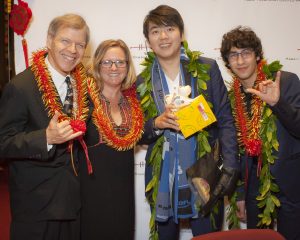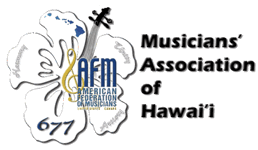Member Spotlight: Jim Moffitt, the Music Man

Symphony Clarinetist James Moffitt (far left) celebrates after the Feb. 18 HSO concert, featuring Chinese classical pianist Lang Lang (third from left). Also pictured: HSO Marketing Director Heather Arias de Cordoba and pianist Maxim Lando. PHOTO CREDIT: John Kuamo’o
Everybody in town knows Jim Moffitt, Symphony musician, Chamber Music Hawai’i president, AFM Local 677 union vice president, and an all-around nice guy.
He’s been in the Honolulu Symphony Orchestra, now Hawai’i Symphony Orchestra since forever — 1981 to be exact. And he lived through the infamous 2009 bankruptcy drama.
Actually, he was one of the key figures in the thick of the battle during some contentious negotiations.
Originally from Illinois, the HSO associate principal bass clarinetist may be a nice guy, but he’s no pushover. He is a staunch advocate for musicians and the union that represents them.
He’s also super-busy, putting on shows year-round. Besides performing for the HSO, Moffitt’s a mainstay at Chamber Music Hawai’i (CMH), as a part of the Spring Wind Quintet — one of the featured yearly ensembles.
So it was quite an honor when he agreed to fit in an interview for Ke Ola O Na Mele.
Where are you originally from, and how did you end up here?
I was born in Urbana, Ill. I auditioned for the Honolulu Symphony in the summer of 1981 and was offered the position. My first rehearsal was Aug. 3, 1981.
What made you decide to make Hawai’i your home?
I have auditioned over 50 times for orchestras all over the U.S. and Canada, and the HSO is the only permanent job I was ever offered. Since I have never won another permanent position on another orchestra I wanted, and still want a career as an orchestra musician, I have continued working with the HSO (now called the Hawai’i Symphony Orchestra).
Was it an easy transition from the Mainland to Hawai’i?
I was living in Chicago when I was offered the HSO position. Chicago has a very vibrant classical music scene. Honolulu’s was not as large. That was the main thing I noticed when I moved here. Other than being further away from my family than I had ever been, the transition was easy.
Any regrets?
I wish I could have gotten a permanent position in a better-paying orchestra. That is the main thing I regret about staying here. For most of my career here, I remained very active musically. I performed fairly often with the Chicago Symphony and was in the Santa Fe Opera Orchestra for 10 summers and at the Aspen Music Festival for seven summers. Those activities have slowed a bit recently, but I still do what I can to perform outside of Hawai’i.
Hawai’i sure has changed since the post-WWII boom. There used to be more live music around, and more people willing to go see live music. What was it like back then for you?
When I arrived here in 1981, many of the hotels had collective bargaining agreements and there were some 1,200 members in Local 677. The Union had field reps to make sure all of the working musicians were being treated fairly. Union meetings were always well attended in Studio 1. Since I never worked in Waikiki, I can’t speak to much beyond that.
There’s not much live music now. The numbers are down even with the HSO. What are your thoughts?
The number of musicians in the HSO has not changed in many years. We still have 64 full-time musicians and about 20 contracted part-time.
The amount of work was greatly disrupted by the bankruptcy in 2009. Had that been avoided, I think we could have been able to keep a longer season going. It could still be possible to grow again, but it will require well-planned, consistent follow-through.
What do you love about living here in Hawai’i?
One of my favorite things about Hawai’i is being able to be outside all year-round. I also am very moved by the native culture.
Besides performing with the Hawai’i Symphony Orchestra and Chamber Music Hawai’i, as well as touring with the Chicago Symphony, you’re active in the union, currently as its vice president. How important is it for you to keep fighting for the working musicians in this post-recession?
I think it is always important to stand up for your rights. The HSO musicians are covered under a Collective Bargaining Agreement (CBA) between the Symphony and the Union, so we have to re-negotiate it when it expires.
Advocating for musicians’ rights can be a thankless job, when the world is apathetic to downright contemptuous of the performing arts in favor of making a buck. What is it like for you to deal with this kind of attitude on a daily basis as a working musician and a proud union member?
I don’t have to deal with bad attitudes on a daily basis. If I am in a situation where positive engagement can help, I engage in such discussions. If it’s clear that type of thing will not be productive, I just try to keep moving forward.
Musicians of note hail you as a nice guy in a business that’s often not nice. You’ve been around forever, so you know the ins and outs of the business of music, especially the tumultuous times of the infamous Symphony contract negotiations and its bankruptcy. You’ve even been in the very thick of the Symphony drama as a union advocate. How would you describe this time, and how did you try to represent musicians’ interests?
My time as HSO negotiator began in 1984 and I’m still somewhat involved today, although no longer as chairman of the Player’s Committee. I have seen so many things in my 34 years of involvement that it would take way too long to describe things here. We always had excellent support and help from the other HSO musicians (both those on and off the Negotiating Committee), Local 677 leadership, the AFM and the International Conference of Symphony and Opera Musicians. We all guided each other as to the best course of action during each negotiation.
What led you to become a musicians’ union advocate?
I decided to become a musician late in my college years. I found myself more interested and motivated by it than anything else. I was proud to join my hometown local in 1973. I received a pension payment in my first paycheck and still do. Early on, I decide that if I was going to complain about issues I didn’t like, then I needed to take some responsibility and step up to see if I could help make positive changes on those issues. I think that is an important part of being a union member. I never expected the union to do everything for me. I knew that I had to contribute to making things better. That’s how it works.
I read in an interview that you wanted to be a baseball announcer or a spaceman growing up. You could’ve also gone in a totally different direction after college — a scientist, maybe professor. In hindsight, would you have done anything differently?
I would love to be an announcer for a major league baseball team. I did not have the motivation to try that at the time. I had the motivation to become a musician. I believe it’s a bit late now. I was never a good enough student to make it in the astronaut training program. I earned a Bachelor’s and Master’s Degree in Music, so I could not have become a scientist or professor at that time and I had no desire to do either of those things [then].
There’s gotta be a good reason why you keep plugging away in a field that’s arguably gone largely ignored. What have been some of the greatest moments or achievements for you as a Symphony musician, something that’s made all the sacrifices and trials worthwhile?
I’ve never looked at classical music as being largely ignored. I’ve experienced many large and enthusiastic audiences during my career. I also met many very generous classical music supporters and benefactors. In some places, it seems that the sustained, long-term support necessary for long-term stability and success is difficult to come by.
I’ve been extreme lucky and I have had many amazing performing experiences during my career. There have been so many highlights. Playing principal clarinet in Vienna’s Musikverein with the St. Louis Symphony and performing, touring, and recording as an extra with the Chicago Symphony with many great conductors and musicians over the years are among the highlights.
How do you survive in Hawai’i playing music? A lot of musicians must take day jobs. You perform quite a bit year-round, not just with the HSO and the Spring Wind Quintet, but the Chicago Symphony for a great many summer tours. You also performed for two seasons as acting assistant principal clarinet with the St. Louis Symphony.
Until the HSO bankruptcy, it was easier to survive. I just do what I can to make things work. It would not be possible with my schedule to have a traditional day job.
Back when you first started playing in school, you went with the clarinet on the suggestion of your friend who played. How well did you take to it?
I did not become a serious clarinetist until my junior year of college. That is extremely late for my career. Sometimes, it still feels like I am playing catch-up. I have learned how to make the best of reeds. I can usually get most of them to play well enough to use in a rehearsal. A concert is a different story.
What did you most enjoy about playing the clarinet?
When you have a good reed, I think the clarinet can exhibit a great range of expressive possibilities.
Did you ever want to stray to say, maybe the trumpet? Trumpet is the most popular instrument for boys in school nowadays.
I have never had any desire to play the trumpet. In college, I played sax and flute, along with the clarinet. I almost decided to try to earn my Master’s Degree in Woodwinds, but decided to concentrate on the clarinet, which I enjoyed better than the other woodwinds.
Why classical music over pop or jazz?
In my teenage years, I was very knowledgeable about the pop music of those days. But then, I began to realize that I was moved on a deeper level by hearing classical music. That feeling kept going and still occurs today. I have always loved jazz, but I wasn’t as motivated to go in that direction.
What’s a good day look like to you?
A good day is having a good reed and having my favorite baseball team win.
Who is your favorite baseball team?
St. Louis Cardinals, since 1964, when they came from way behind during the last week of the season, won the pennant, and then beat the Yankees in the World Series.
What gigs do you look forward to the most every year, and why?
I always look forward to my next gig. There is always something new and challenging, even if it is repertoire you have performed before. There is always a chance to create something new and different.
— Carol Banks Weber
From the Spring/Summer 2018 issue, Ke Ola O Na Mele
